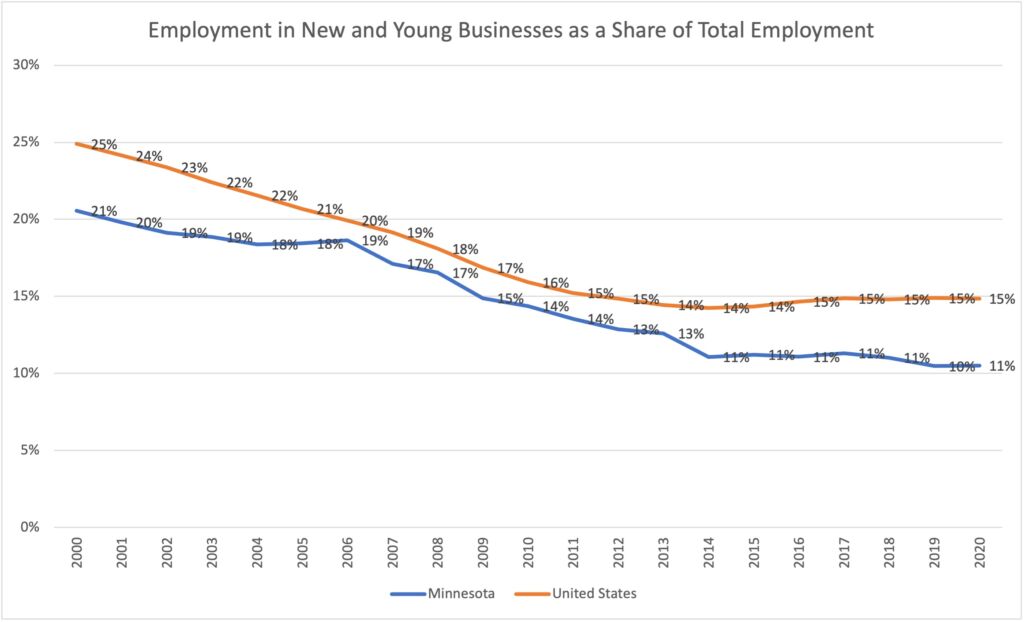To help small businesses, lawmakers should loosen regulations
This week is National Small Business Week. And to celebrate small businesses, a bunch of events have been planned around this topic in Minnesota. As the Department of Employment and Economic Development (DEED) announced in its press release,
From September 13 – 15th of this week, Commissioner Grove will be visiting small businesses to celebrate their contributions to their communities and the SBA will host a three-day virtual summit with numerous educational panels providing innovative practices for entrepreneurs.
“Here in Minnesota, new small businesses are more likely to be thriving at five years than anywhere else in the country,” said DEED Commissioner Steve Grove. “At Minnesota’s Department of Employment and Economic Development (DEED), we are working hard to support small businesses whether they are launching the next new medical device start up or have been a community staple for decades.”
Indeed, small businesses make up a significant part of Minnesota’s economy, employing 46 percent of all state workers, and accounting for 1.3 million jobs. But trends in recent years have not been favorable for small businesses — especially new and young ones.
For example, while Minnesota’s rate of business survival at five years is one of the highest in the nation, employment in new and young businesses has been dwindling at a faster rate compared to the rest of the nation, as has the share of new and young businesses.

In 2020, New and Young Businesses made up only 31.3 percent of Minnesota’s total businesses. The national average was 37.7 percent. however. Additionally, between 2000 and 2020, the share of New and Young Businesses decreased by 4.6 percentage points in Minnesota, while nationally the decline was just 4.2 percentage points.
Regulation is a big issue facing small businesses
High taxes are of course a big part of this trend as John Phelan has illustrated, and lowering them would go a long way toward helping small businesses.
But another way through which Gov. Walz and the Minnesota legislature can help small businesses and entrepreneurs is by creating a conducive regulatory environment. On various measures, Minnesota does not rank favorably when it comes to regulation affecting small businesses.
The 2015 Small Business Index from the Pacific Research Institute, which analyzes states on numerous land and labor regulations, for example, ranked Minnesota as the 32nd least burdensome state when it comes to regulations affecting small businesses in 2011.
Why does Minnesota rank so low? Minnesota is not a right-to-work state which reduces worker and business freedom. Family leave regulations are also restrictive. Other laws like workers’ compensation insurance and minimum wage also score lower, although not as bad as family leave and right-to-work policies.
While Minnesota scored very well on occupational licensing, in the last couple of years our state has seen the breadth and reach of licensing grow and our rankings have gotten worse. Minnesota also ranked low on land use regulations (33), state energy regulations (34), as well as telecommunications regulations (50), among other things.
These rankings have only gone worse in recent years. A 2019 Small Business Policy Index from the Small Business and Entrepreneurship Council ranked Minnesota 45th among the states for how friendly its policy environment is to small businesses.
Minnesota’s major economic hub –– Minneapolis –– has also consistently ranked low on the Doing Business in North America Index. This is a study that ranks cities in six categories on the ease of starting and operating a small or medium-sized business; (1) starting a business, (2) employing workers (3) getting electricity (4) registering property (5) paying taxes, and (6) resolving insolvency. In 2018, Minnesota ranked 40th among major US cities.
Conclusion
Small businesses are integral to the economy of Minnesota. And to really help these businesses, Gov Walz and the legislature need to look into reforming Minnesota’s regulatory environment to make it more conducive to their operations.